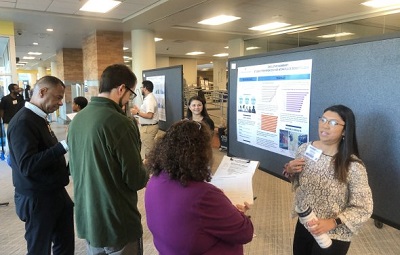Development of a Dendritic Silver SERS Substrate on a Novel Aluminum Platform
Description/Abstract/Artist Statement
Surface enhanced Raman spectroscopy (SERS) is an invaluable analytical technique that employs the localized surface plasmons of noble metals to provide structural and quantitative information about low concentration analytes. Though highly sensitive, typical SERS substrates bear a high background signal and are often tailored to specific analytes, which hinder their reproducibility, application, and limit of detection. This study has developed an uncapped silver dendritic SERS substrate on an aluminum well array that eliminates the background signal seen on other platforms, such as cellulose paper or glass. The substrate provides an incredibly high signal-to-noise ratio at as low as 1 ng/mL for the nucleobase adenine, which extends to adenosine nucleotides and the nucleotide analog drug Tenofovir as a part of a larger study on the quantification of HIV metabolites. The high geometric variability in the hotspot configuration of the silver dendrites translates into high standard deviation in signal-to-noise, making consistent quantification challenging. Thus, high resolution and high throughput spatial mapping of the substrate array by a novel XY translational Raman scattering device has allowed statistical sampling of high intensity hotspots to reduce the standard deviation in signal-to-noise. The averages of the sampled spectra produce a linear calibration curve across several orders of magnitude, enabling the dendritic substrates to provide highly quantitative analysis despite their chaotically variable surface chemistry. The dendritic silver substrates on aluminum demonstrate an enormous potential as an exceptionally sensitive, portable, cost-effective, and shelf-stable SERS substrate with a broad range of applications.
Faculty Advisor/Mentor
Dr. John Cooper
Faculty Advisor/Mentor Department
Chemistry & Biochemistry Department
College Affiliation
College of Sciences
Presentation Type
Poster
Disciplines
Chemistry | Physical Sciences and Mathematics
Session Title
Poster Session
Location
Learning Commons Lobby @ Perry Library
Start Date
3-25-2023 8:30 AM
End Date
3-25-2023 10:00 AM
Upload File
wf_yes
Development of a Dendritic Silver SERS Substrate on a Novel Aluminum Platform
Learning Commons Lobby @ Perry Library
Surface enhanced Raman spectroscopy (SERS) is an invaluable analytical technique that employs the localized surface plasmons of noble metals to provide structural and quantitative information about low concentration analytes. Though highly sensitive, typical SERS substrates bear a high background signal and are often tailored to specific analytes, which hinder their reproducibility, application, and limit of detection. This study has developed an uncapped silver dendritic SERS substrate on an aluminum well array that eliminates the background signal seen on other platforms, such as cellulose paper or glass. The substrate provides an incredibly high signal-to-noise ratio at as low as 1 ng/mL for the nucleobase adenine, which extends to adenosine nucleotides and the nucleotide analog drug Tenofovir as a part of a larger study on the quantification of HIV metabolites. The high geometric variability in the hotspot configuration of the silver dendrites translates into high standard deviation in signal-to-noise, making consistent quantification challenging. Thus, high resolution and high throughput spatial mapping of the substrate array by a novel XY translational Raman scattering device has allowed statistical sampling of high intensity hotspots to reduce the standard deviation in signal-to-noise. The averages of the sampled spectra produce a linear calibration curve across several orders of magnitude, enabling the dendritic substrates to provide highly quantitative analysis despite their chaotically variable surface chemistry. The dendritic silver substrates on aluminum demonstrate an enormous potential as an exceptionally sensitive, portable, cost-effective, and shelf-stable SERS substrate with a broad range of applications.


